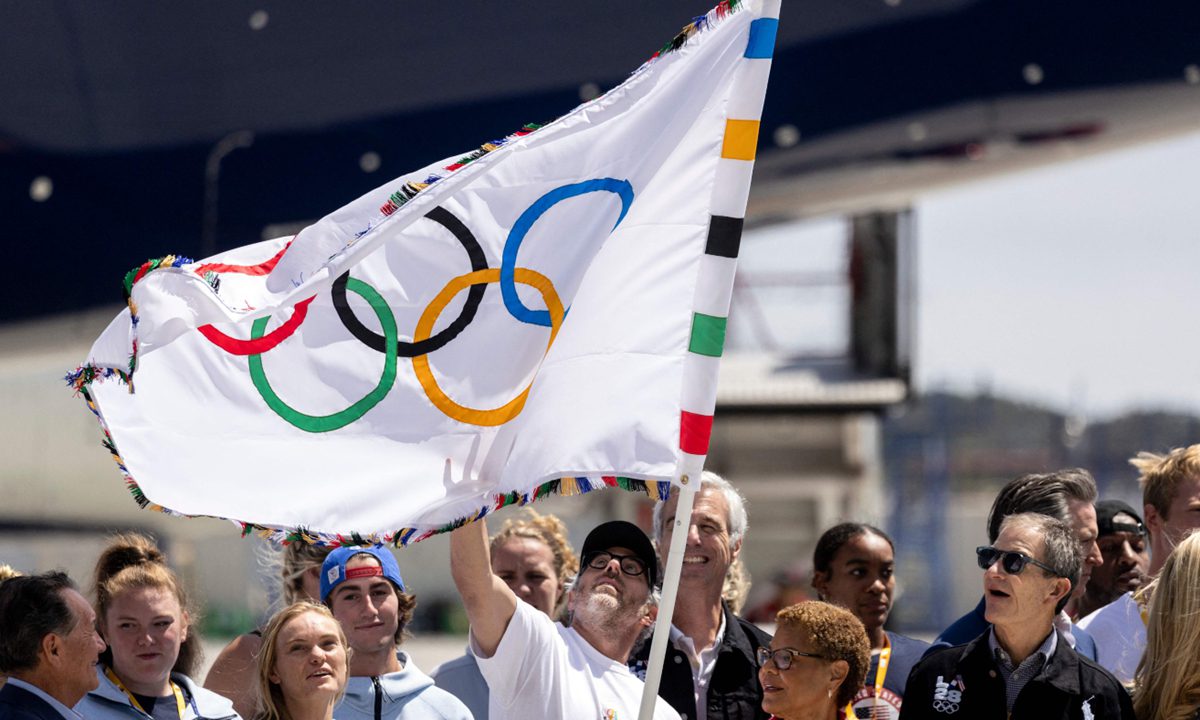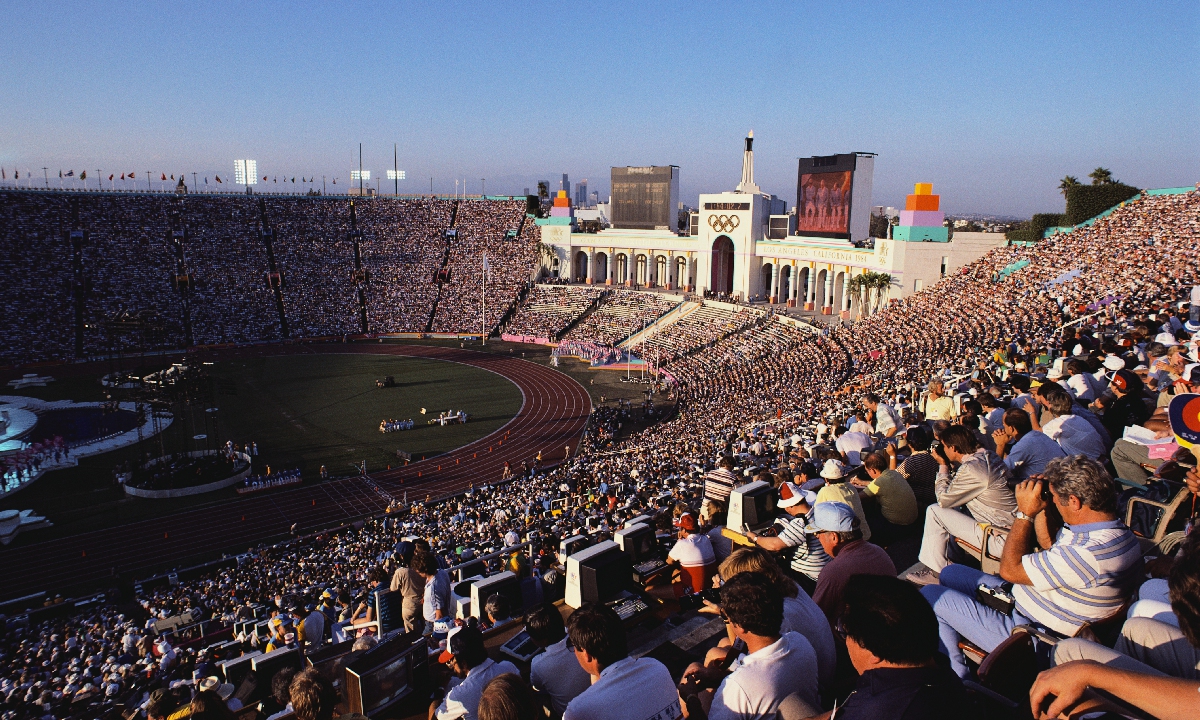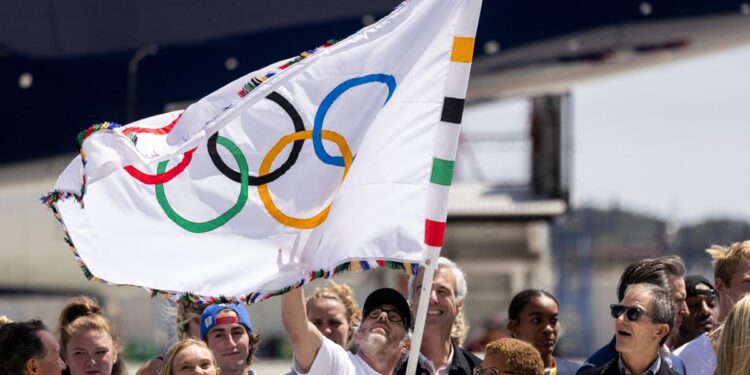
The Olympic flag arrives at Los Angeles International Airport in Los Angeles, the US, on August 12, 2024. Photo: VCG
As the curtain came down on the Paris 2024 Olympic Games, global focus shifted to Los Angeles where the 2028 Summer Olympics will be hosted, but has since been stuck with queries about the anti-doping management issue surrounding the US authorities.
The World Anti-Doping Agency (WADA) has, in the recent past, criticized the US Anti-Doping Agency (USADA) for a scheme allowing athletes with anti-doping violations to continue competing for years without sanctions, violating both the World Anti-Doping Code and USADA’s own rules.
The China Anti-Doping Agency (CHINADA) has also demanded an independent investigation into the actions of the USADA, pointing out that USADA’s conduct severely undermines the integrity of sports due to its lack of transparency and double standards.
It’s unclear how big the total scale of the USADA scheme is, as multiple US professional leagues and college associations refuse to be brought in under the WADA system.
The WADA said in July that a large number of national and international anti-doping and sporting groups
from around the world have raised concerns about this and have criticized attempts by the US to politicize the clean sport movement as led by the WADA.
Einar Tangen, a senior fellow at the Beijing-based think tank Taihe Institute, said Tuesday that “Washington preaches constantly about the sanctity of an ‘international rules-based order,’ but doesn’t practice it.”
Casting a shadow
In the Olympics contract between the International Olympic Committee (IOC) and the 2034 Winter Olympics organizing committee – another Olympic event to be held in the US, a clause gives the IOC a right to withdraw the Games if the US fails to fully respect the authority of the WADA, or if the application of the Code is obstructed or undermined.
In a statement in July, CHINADA urged the US to respect WADA, emphasizing that adhering to WADA and IOC’s decisions is a requirement for the US to host the Olympic Games. This comes after the USADA openly questioned WADA’s review results on certain anti-doping issues.
The US is leveraging the Rodchenkov Anti-Doping Act, a domestic law, which grants the US the power to criminally prosecute and judge athletes involved in doping.
Dick Pound, founding president of WADA, bridled at the Rodchenkov Act, warning that the US could pay the price for overreaching in its investigations.
Chinese swimmers were put under heavy scrutiny ahead of and during the Paris 2024 Olympics due to US pressure, as the US claimed that the CHINADA, the WADA, as well as the world swimming governing body World Aquatics, were engaging in a “cover-up” of a 2021 food contamination case involving 23 Chinese swimmers.
The CHINADA cleared the Chinese athletes of wrongdoing, and both the WADA and World Aquatics said the review process found no evidence of “irregularities, mismanagement, or [a] cover-up.”
Mao Jiale, a Chengdu-based sports commentator, noted to the Global Times that the USADA’s approach is aggressively “guilty until proven innocent” in stark contrast to its claim of protecting clean athletes.

The 1984 Los Angeles Olympics opening ceremony is held on July 28, 1984 at the Los Angeles Memorial Coliseum, which will also host the 2028 Olympics. Photo: VCG
“Their stringent measures have often been criticized for targeting foreign athletes while overlooking domestic doping issues,” Mao told the Global Times. “This selective enforcement undermines global trust and raises questions about fairness.”
Tangen also noted that Washington’s stance reflects a belief that the US is bound by no laws except its own, noting the US’ exceptionalism stance is seen as hypocritical when it comes to imposing sanctions on other nations for alleged doping violations, casting a shadow over the prospect of a fair and clean LA Games.
The country’s long-arm jurisdiction approach in this area is a clear attempt to maintain a competitive advantage over others, Xie Maosong, a senior research fellow at Tsinghua University’s National Institute of Strategic Studies, told the Global Times.
Xie said that the US’ departure from the international anti-doping framework and the USADA’s double standards toward domestic and foreign athletes can be seen as a reflection of its hegemonic logic.
With this logic, the US has been accused of selectively enforcing anti-doping rules.
During the Paris 2024 Olympics, China’s sports minister Gao Zhidan voiced concerns over these issues in a meeting with the US Olympic Committee chief Gene Sykes, stressing the need for the US to honor its commitments and cease its overreaching practices.
Controversial history
The world’s most decorated swimmer Michael Phelps recently claimed that if one athlete tested positive, he/she should never be allowed to come back and compete again.
This statement would be the most appropriate if applied to the US, where drug abuse among athletes has a long history. During the severest period in the last century, many US athletes were found to be heavily using performance-enhancing drugs.
US sprinter Erriyon Knighton, 20, finished fourth in the men’s 200-meter final at the Paris Olympics. However, his abrupt departure from the media zone without taking interviews has fueled further suspicion regarding his eligibility to compete.
Knighton tested positive for the banned steroid trenbolone during an out-of-competition test on March 26. The USADA opted not to impose a suspension, attributing the positive result to contaminated meat.
US sprinter Justin Gatlin has won multiple Olympic medals, including gold in the 100 meters at the Athens 2004 Summer Olympics and silver in the 100 meters at the Rio 2016 Summer Olympics. But what’s more notable is his doping history: He tested positive for testosterone twice in 2006 and amphetamines in 2012.
There is even a more high-profile group case – the Nike Oregon Project, known for training several elite long-distance runners including Galen Rupp and Mo Farah.
The investigation ultimately led to coach Alberto Salazar receiving a four-year ban for trafficking testosterone and tampering with the doping control process. The investigation also included claims that Salazar had tried to influence and encourage athletes to use these substances.
The lack of integration of the WADA’s anti-doping regulations into US college sports creates a significant gray area. This gap in oversight can be detrimental to young athletes, potentially allowing performance-enhancing drugs to influence their careers if gone unchecked.
“The Los Angeles 2028 Summer Olympics represent an opportunity for the USADA to demonstrate its commitment to fairness and integrity,” Mao noted. “By addressing selective enforcement, revising its stance on domestic doping offenses, and fostering transparency, the USADA can rebuild trust and reinforce the credibility of anti-doping efforts.”
Source link : http://www.bing.com/news/apiclick.aspx?ref=FexRss&aid=&tid=66bb880089a74016ab06759ab57be5be&url=https%3A%2F%2Fwww.globaltimes.cn%2Fpage%2F202408%2F1317971.shtml&c=3299423270703996883&mkt=en-us
Author :
Publish date : 2024-08-13 05:18:00
Copyright for syndicated content belongs to the linked Source.






